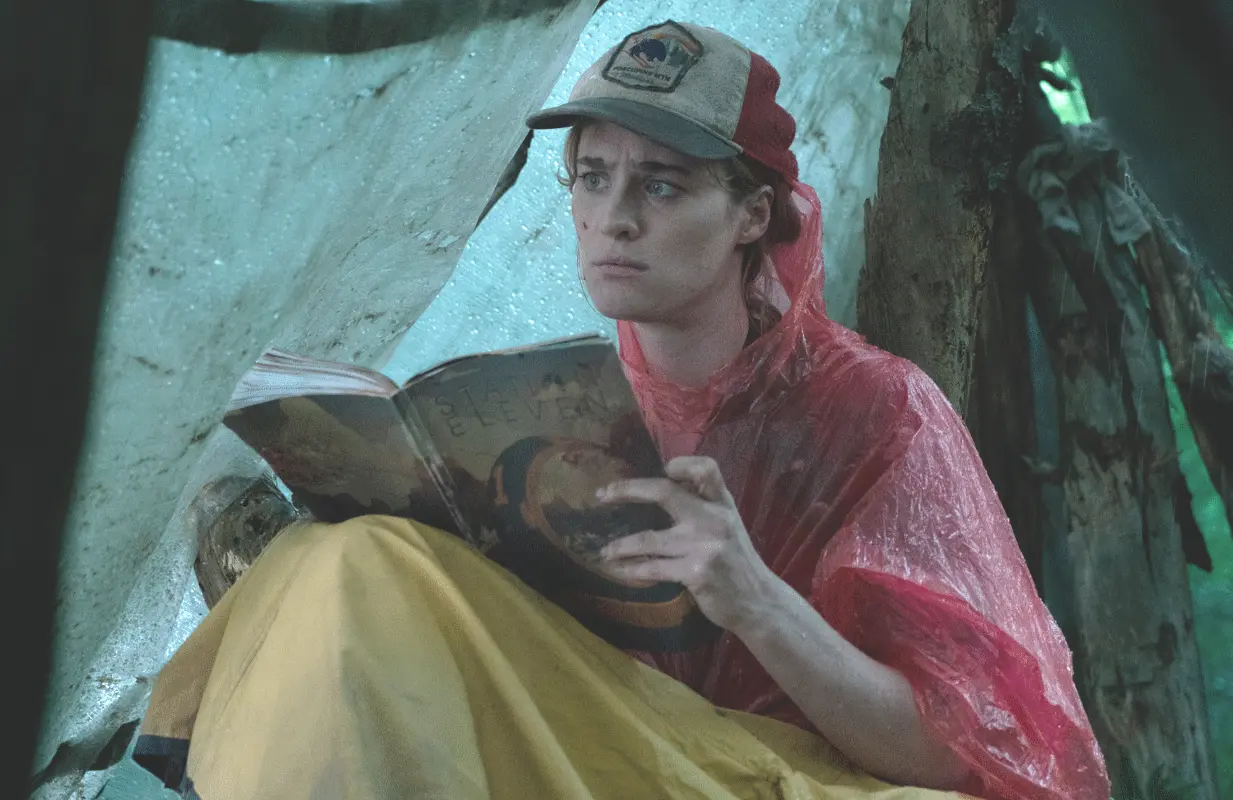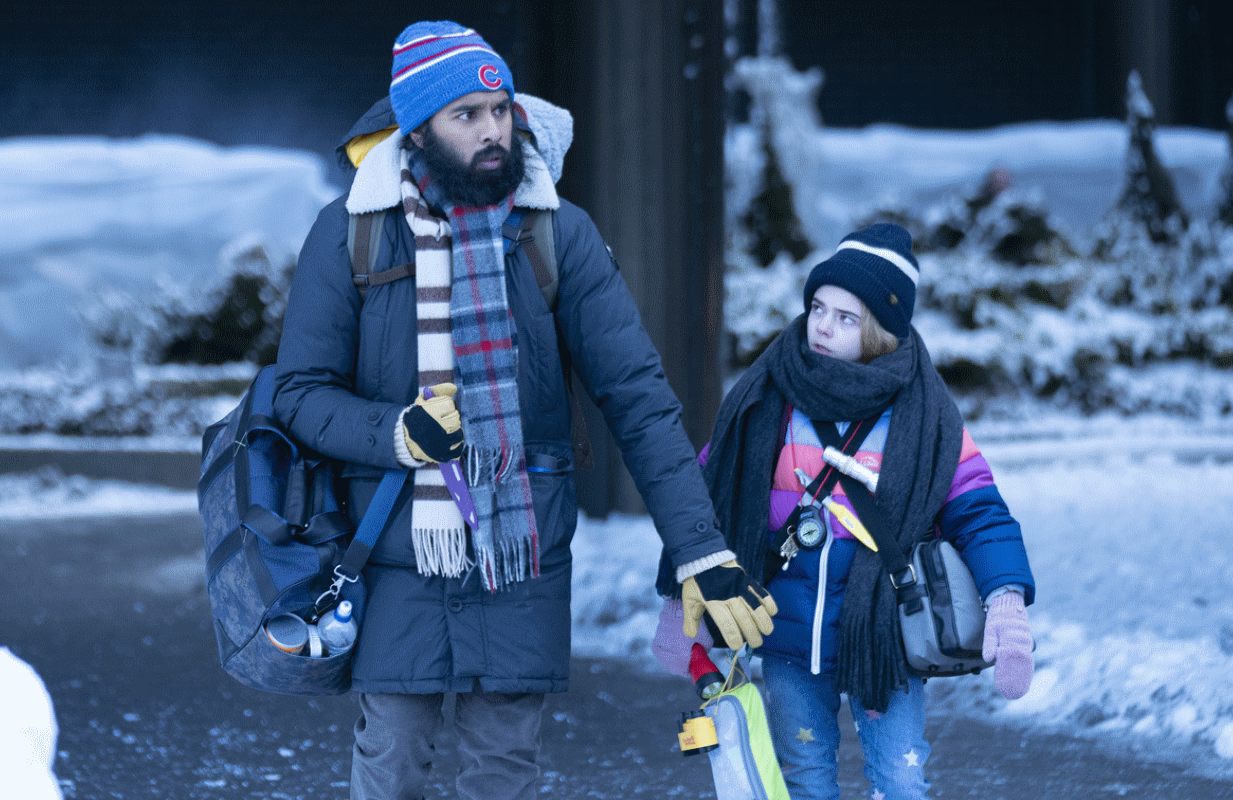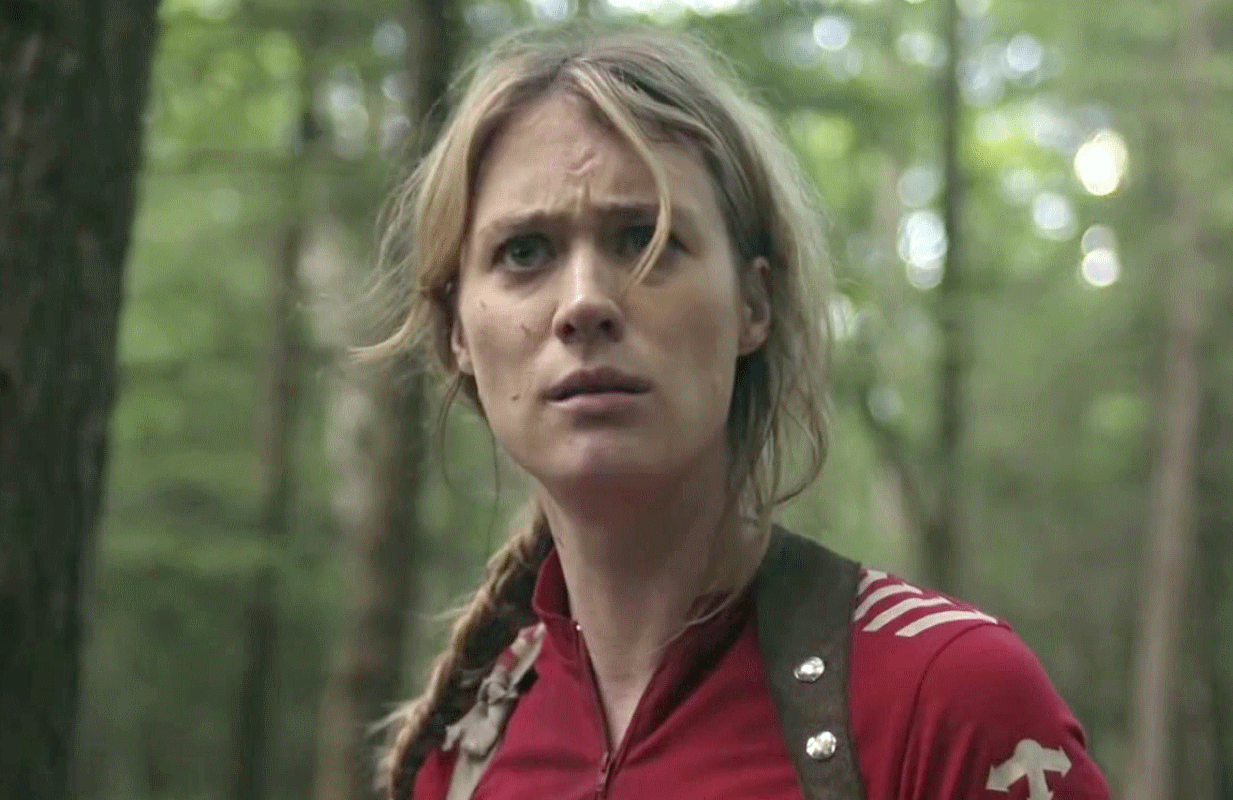Five Reasons You Should Watch Station Eleven (Even Though It's About a Pandemic)
-
 Mackenzie Davis in Station Eleven. (Photo: HBO Max)
Mackenzie Davis in Station Eleven. (Photo: HBO Max)Station Eleven is a triumph of visual storytelling, one of the best shows you'll watch this year. But there's a catch, one that will likely prevent some — perhaps many — from watching this ten-episode HBO Max miniseries: its plot hinges on a worldwide pandemic that hits in the very first episode. No, Station Eleven isn't a show made in response to the COVID-19 pandemic. It's based on a novel published in 2014, which happened to be ordered to series in the summer of 2019. It's just one of life's little coincidences that it's arriving on our TV screens nearly two years into our own worldwide pandemic.
Written by Emily St. John Mandel, the novel Station Eleven was critically acclaimed, a National Book Award finalist, and the winner of the Arthur C. Clarke Award for science fiction. It tells the sprawling story of a catastrophic worldwide pandemic that begins on the same night that a famous actor dies of a heart attack on stage during a production of King Lear. The narrative then leaps 20 years forward in time and follows a traveling band of theater performers, while at the same time doubling back to revisit the actor while he was alive. Filming on the series began in January of 2020, with production shut down by COVID two months later before ultimately re-starting in February of 2021. And now it's here, on HBO Max.
The fact is, asking viewers to sign up for a dramatic series about a pandemic-ravaged world is a tall order. On a very basic level, it's hard to want to watch something that's been a constant source of fear and depression for two years. Distraction has been the watchword for many people, and Station Eleven would not seem to be that. Here's the thing, though: it's also an engrossing, emotionally satisfying TV series. If you think you've got it in you to push past the subject matter, there's a good chance you'll feel quite rewarded. If you're still on the fence, here are five reasons why Station Eleven is worth your time.
The Fiction Is Much Worse Than Reality
This may not seem like a good thing, but it really is. There's something perversely comforting in the fact that the killer flu that begins ravaging the world in the first episode is more contagious, more deadly, and faster spreading than COVID. There are haunting echoes, of course. The first character we follow is Jeevan (Himesh Patel), who attends a live production of King Lear in Chicago where the star, Arthur Leander (Gael Garcia Bernal) drops dead of a heart attack on stage. In the commotion afterwards, Jeevan sees Kirsten, a child actress alone and uncared for, and he takes it upon himself to see that she gets home. Of course "getting home" becomes more complicated after he gets a call from his sister who works at the local hospital, who tells him about the fast-spreading flu and implores him to get to their brother's high-rise apartment as quickly as possible and barricade themselves inside.

The glimpses that we get of the pandemic are rooted in the characters we're following: Jeevan and Kirsten at first, Jeevan's brother Frank (Nabhaan Rizwan), and his sister briefly. Things look ominous, then bad, and then terrifying, but we're not inside any war rooms or privy to epidemiologists briefing the President. We see it in eerily empty streets, the confusion in a supermarket clerk's eyes, and in the chaos rumbling at the periphery. Jeevan says the words "the end of the world" a few times, so matter-of-factly that he can't seem to believe it himself. But that's what it is. As the first episode ends, something happens that only happens in movies about unspeakable disasters, but it's still filmed from an eerie remove.
It Creates a Brand New World
By the end of the first episode, the narrative has jumped ahead 20 years. Kirsten is now grown, and played by Mackenzie Davis (Halt and Catch Fire). The events of that first year of the pandemic are now so long behind her that the memories are vague and occasionally haunting. While this isn't the last we see of young Kirsten in those frightening early days, the narrative charges forward. Kirsten is now a part of the Traveling Symphony as they tour the Great Lakes region, putting on Shakespeare productions and bringing the survivors in their small and isolated towns a small taste of the world that was lost. These episodes are beautiful and touching, but also not without their own darkness in the form of a character called the Prophet (Daniel Zovatto).
Unsurprisingly, this series from former The Leftovers writer Patrick Sommerville does a very good job of imagining a post-disaster world. Smaller communities have emerged from the ruins of the old societies and given names like St. Deborah By the Water, named after a survivor who died heroically, but technology is a thing of the past and connections to the world outside the Symphony's limited geographical region are sparse. There's something comforting in this simplicity and the ways these communities have found to move forward. The Symphony itself is a ragtag band of artists bringing brief lightness when they pass through, despite everybody harboring their own haunting memories of what they've been through. Composer Dan Romer's score asserts itself most gorgeously in these scenes.
It's Structured Like a Mystery
Which isn't to say that there's something to be solved. The origins of the pandemic are not in question, nor is there some great figure behind the curtain pulling the strings. But there are connections between the characters and stories we're following, and it's fascinating to follow them until they click into place. As a child actress, Kirsten was briefly mentored by Arthur Leander, who in the days leading up to his death had briefly reconnected with Miranda (Danielle Deadwyler). Their relationship, as well as Miranda's experience as the pandemic descends, is given its own spotlight episode, and Arthur's relationships with friends (David Wilmot's Clark) and lovers (Caitlin FitzGerald's Elizabeth) also have far-reaching impact on the story years into the future. How does this all come together? And what of the mysterious astronaut figure at the center of a graphic novel called Station Eleven that Kirsten seems so obsessed with?
The Performances Are Fantastic

Anyone who's seen Halt and Catch Fire or her many film performances won't be surprised to see that Mackenzie Davis is magnetic at the center of Station Eleven's Travelling Symphony. She's haunted by her past but determined to safeguard her future and the future of her makeshift family, something that comes under threat with the arrival of the prophet. As her younger self, Matilda Lawler is odd and compelling in a way that deeply fits the material. But I found myself most moved and compelled by Himesh Patel and Danielle Deadwyler as Miranda. Patel has a soft, often aloof affect that contrasts with the heaviness of the descending apocalypse in a way that immediately bonds us to him. Deadwyler, last seen in Netflix's raucous western reimagining The Harder They Fall, has a difficult task in playing the deeply interior Miranda, but she manages to beautifully communicate Miranda's ambivalence over her relationship with Arthur and, later, her growing terror at not just the coming apocalypse but also at the mountain of regret it presents to her.
It's a Lighter Touch Than You Might Expect
If you've seen The Leftovers, this will come as less of a surprise. The Leftovers was a show about trauma — the deep existential trauma of living in a world where something awful that you never thought was even possible happens, and it could happen again — and how that trauma drives people to extremes, including religious devotion. That's not exactly what Station Eleven is about, but it's also not not what it's about. And yet in both cases, there is a playfulness running beneath the surface that feels like a note of grace for the characters and the audience. It's there in characters being just a little bit kinder to each other when you don't expect them to. It's there in characters who say something wise followed by something silly. There's comfort in this vision of a world where the worst thing imaginable has happened and we're still putting on plays and trying to be better and to connect with one another. It's not that Station Eleven is the antidote to these pandemic times. It's an acknowledgement that even without an antidote, we can enjoy a story well told for a little bit.
The first three episodes of Station Eleven drop today on HBO Max, with new episodes set for the release Thursdays through January 13, 2022.
People are talking about Station Eleven in our forums. Join the conversation.
Joe Reid is the senior writer at Primetimer and co-host of the This Had Oscar Buzz podcast. His work has appeared in Decider, NPR, HuffPost, The Atlantic, Slate, Polygon, Vanity Fair, Vulture, The A.V. Club and more.
TOPICS: Station Eleven, HBO Max, The Leftovers, Himesh Patel, Mackenzie Davis